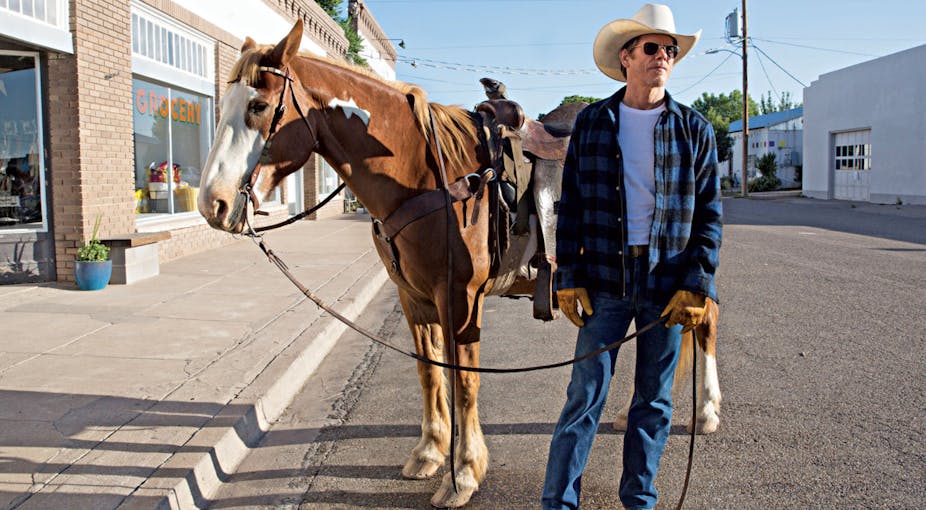For decades we’ve been told that originality is dead, courtesy of postmodern culture. We have been made to believe that everything these days is copied and recycled, and that we are forever confined to reading and watching the same stories and familiar ideas on a loop.
I believed this popular nonsense until two weeks ago when I first watched Amazon’s new TV series with a deliberately unpalatable title, I Love Dick. It is the story of an exhausted, failing female film director, Chris (Kathryn Hahn), who chases a famous academic and artist, Dick (Kevin Bacon), all double denim and cowboy boots on horseback.
Based on a 1997 novel by Chris Kraus, the series was created by an almost exclusively female team of writers and directors led by showrunner Jill Soloway, creator of hit transgender drama Transparent for Amazon.
Chris and her husband, Sylvere (Griffin Dunne), first meet Dick in the privileged artists’ colony of Marfa, Texas, where Sylvere, a Holocaust historian, takes up a position at an arts institute headed by Dick himself. At the first meet-and-greet, Chris is referred to dismissively as “the Holocaust wife”.
A woman undone
Despite being married, the female protagonist stalks her handsome, blue-eyed and mysterious cowboy by following him around, breaking into his house and writing him endless letters bursting with highly embarrassing, obsessive confessions and fantasies.
The very first episode was quite a shock, but not because of the abundance of sexual references, or nudity, or swear words – they have become so commonplace on screen that we have been pretty desensitised to them.
I have simply never seen a female character presented in such a candid way on screen before – so awkward, so clumsy, so raw. She has been divested of the mask of “prettiness” or “passivity” demanded by society and falls in love with someone off limits, declaring her feelings for him openly and publicly. At one point she prints out the letters and sticks them to every public building in town.

Then I had an epiphany: most of the postmodern theorists were male. It is easy to see why they concluded that every creative possibility had been exhausted. In their world, they have. There is nothing new left to say about the male protagonist off in search for life’s meaning.
Until fairly recently, we have viewed the world through the male gaze: men fighting enemies, men in love, men obsessed, men failing, men winning. Basically, this is men taking matters into their hands, arranging and reflecting the world the way they see it. They own the perspective, they own the “gaze”, as the feminist author Laura Mulvey argued back in 1975 in her seminal essay Visual Pleasure and Narrative Cinema.
Men look and women accept the fact that they are being looked at, and try to be behave accordingly – as prey, as a treasure or as a victim. The woman is not a person, but an empty vessel, a mirror, an object.
Reversing the male gaze
A guru overseeing a small circle of people, Dick likes to control his followers by intimidating them with his inflated theories of art, creativity and life. Surrounded by passive admirers who nod as he explains his trite and boring ideas, he feels safe and in control. Chris is perfect for this kind of treatment – she already lacks confidence, and Dick singles her out for his devastating gaze. What Dick does not know, however, is that not only is Chris not a “victim” – she has enough creative force and agency to break him, to topple him from his pedestal. With Chris, Dick soon finds he is not in control.

In order to reverse the gaze, the female characters of I Love Dick have to be über-confident, to the extent of being arrogant. In a world in which the “looking woman”, the female agent as opposed to the female object, is still seen as something unnatural, arrogance seems to be the only way out. Chris turns the tables on Dick, and starts treating him as fantasy, as an object of her unstoppable, mad obsession – forcing her vision of Dick on to Dick the person.
Another notable story is that of Paula (Lily Mojekwu), Dick’s assistant at his art gallery. Paula has a fresh vision for the place and wants to inject a variety of diverse contemporary artists, but her ideas are constantly rejected by Dick as unworthy; everything he ends up displaying reflect entirely his own minimalist tastes. And as a black woman, traditionally subjugated by the white male gaze, her position is doubly precarious.
Constantly undermined, Paula nevertheless tolerates Dick’s oppressive behaviour until she can no longer live with it. When she announces her resignation, Dick (by now worn out by Chris’s obsession) tells her that he is leaving, and the gallery is hers. At last, she can fully realise her vision unbound.
Taking back control

Women insisting on their right to exist outside the male gaze, to have their own vision – be it awkward (like Chris’s films), scandalous (like Chris’s letters), or brilliant (like Paula’s taste in artwork) – and make it a reality, is still a rare subject on screen. Only a handful of shows deal with it: Netflix’s Orange is the New Black, BBC’s Fleabag and HBO’s Girls.
Importantly, I Love Dick has a positive message for men, too: the female gaze is not scary, monstrous or threatening. On the contrary, it can improve male creativity. Collectively, Chris, Paula and and the other women in their orbit drag Dick and Sylvere out of their creative and spiritual stagnation, challenge their perspective and make them think and live again.
Ultimately, I Love Dick is a rallying call for a reset of the female-male dynamic: looking at each other can be an equal exchange and a dialogue rather than a just a one-sided power play. But most of all, it underscores how badly we need to tell stories from new and different perspectives in TV and film.

